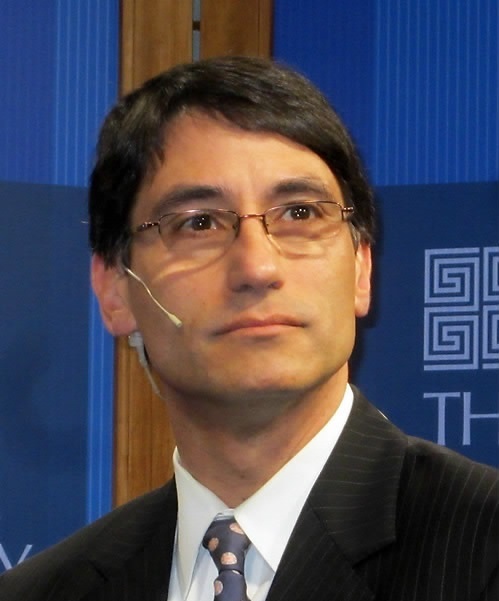Despite the tightening global squeeze on North Korea, Seoul and Washington should narrow their policy objectives and reinitiate engagement in tandem to give the communist state substantive incentives to change course, a renowned US scholar told The Korea Herald.
Frank Jannuzi, president and chief executive of the Mansfield Foundation, raised the need for the allies to refine their current North Korea policies, especially after their respective presidential elections, while shoring up sanctions and enforcement in the meantime.
He proposed a “multifaceted engagement strategy” involving regional stakeholders -- modeled on the Helsinki process during the Cold War -- to be unfolded alongside targeted sanctions that he said are insufficient by itself to bring about a shift in Pyongyang’s strategic calculations.
“I do think it’s appropriate to give sanctions some time to have an impact. ... But I don’t think sanctions are going to be severe enough to change their mind,” Jannuzi said during an interview Thursday on the margins of a forum hosted by the Korea Institute for National Unification in Seoul.
 |
Frank Jannuzi, president and chief executive of the Mansfield Foundation in Washington (Yonhap) |
At the Washington-based think tank, he carries out various research programs on Korean Peninsula issues, some of them in cooperation with the Korea Foundation in Seoul. He formerly served as deputy executive director of Amnesty International in Washington, a stint that he said helped deepen his belief in the urgent need for dialogue on economic engagement, human rights and security confidence-building steps for lasting peace.
Citing China’s steadfast economic and diplomatic backing and lax sanctions enforcement, he offered a downbeat outlook for the forthcoming UN Security Council resolution. It will most likely be a “slight upgrade” from the past ones rather than include core elements such as a ban on fuel, coal and other energy trade with the North.
“I think up to now, our objective has been too grand and out of balance with the tools we have and the strategic environment that we’re operating in,” Jannuzi said.
“We want North Korea to make a strategic choice to abandon their nuclear weapons but the tools and the strategic environment we have are not nearly sufficient to achieve that objective.”
His call for re-engagement comes amid growing concerns over Seoul’s seemingly heavy reliance on sanctions and pressure in which it has a limited sway.
President Park Geun-hye also reaffirmed Thursday that her administration will no longer hold talks which she said together with economic aid have only helped the erratic neighbor to buy time and beef up its military program.
“I think the South Korean government knows sanctions are a tool, not a policy objective. I guess the question is at what point do you assess the sanctions have changed the negotiating environment enough that it is worthwhile re-engaging,” Jannuzi said.
With the US and South Korea each expecting a new leader this and next year, a key task after the elections would be to “recalibrate and refine the objective and decide what objective is realistic for dialogue” in light of the existing tools and circumstances, he said.
Jannuzi, a former Korea policy advisor to US President Barack Obama, pinned high hopes for Democratic candidate Hilary Clinton as the next winner of the White House.
Despite what he called her “failure” to tackle the North Korea issues as secretary of state, the scholar said that she should be “give a second chance” to take a fresh look at the situation and explore new ideas through a joint policy review with Seoul.
“It would allow the sanctions to remain in force for a few months, give a chance to assess their impact, show that we are not going to quickly engage and that we will still be patient, and give her and her administration a chance to refresh their thinking,” he added.
“At some point I hope the US and South Korea (will) launch a new initiative designed to stabilize the situation and open the door to dialogue, and I hope that North Korea would be receptive. You don’t know until you try, but it won’t be easy.”
By Shin Hyon-hee (
heeshin@heraldcorp.com)





![[Exclusive] Hyundai Mobis eyes closer ties with BYD](http://res.heraldm.com/phpwas/restmb_idxmake.php?idx=644&simg=/content/image/2024/11/25/20241125050044_0.jpg)
![[Herald Review] 'Gangnam B-Side' combines social realism with masterful suspense, performance](http://res.heraldm.com/phpwas/restmb_idxmake.php?idx=644&simg=/content/image/2024/11/25/20241125050072_0.jpg)

